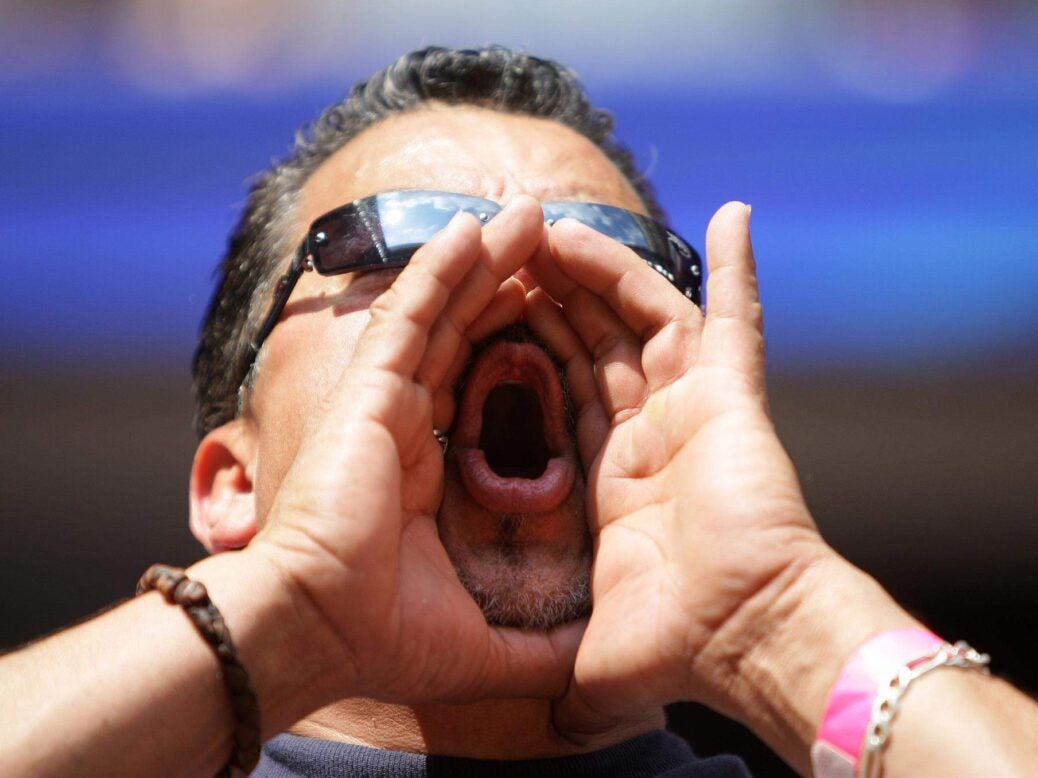
Sam Leith explores the origin of that apelike ‘atavistic bellowing noise’ operagoers make to express disapproval.
I was chatting to my opera-going friend Igor the other day, when he mentioned that the latest production of Lucia (the cognoscenti tend to abbreviate the name) had come in for a lot of booing. ‘It what?’ I asked. Not being an operagoer, I was more astonished than perhaps I should have been: Igor reassured me it was quite normal. I should have heard that William Tell a few years back, he went on cheerfully; though, of course, I couldn’t have heard it because it was drowned out by the sound of booing from the cheap, or rather, expensive seats.
This strikes me as odd. Doesn’t it you? I mean, this is grand opera — for which people have been known to dress up in penguin suits, where tickets cost hundreds of pounds, and the appreciation of which is regarded as a pinnacle of high cultural achievement. Go to Stratford for a Shakespeare production or, for that matter, to your local multiplex to watch Captain America: Civil War, and you can get dirty looks simply for unwrapping sweeties too noisily or slurping your ginormo-bucket of Pepsi unattractively. Start booing, and someone in polyester epaulettes will ask you to sling your hook. Yet what do the fine people do when they don’t like the singing or the production? They open their mouths and they shout ‘Boo!’
Why, of all the performing arts, is opera the one whose aficionados feel it’s acceptable to express their disappointment by making a noise like a dismayed cow? Here is ostentatious connoisseurship given voice through pure hooliganism. I mean, sure: booing is culturally sanctioned at the Christmas panto in the Yvonne Arnaud Theatre, Guildford. It’s practically obligatory to boo when King Rat appears on stage. But that’s different, say what you may about the Commedia dell’arte tradition and the way it issues in high and low culture. I’d like to see someone try to get away with shouting: ‘He’s BEHIND YOU!’ when the statue appears in the final act of Don Giovanni.
Where else do we boo? Sports stars quite often cop it, but, again, sport is different from stage performance — audience participation is part of the experience of live football. And the best expressions of disapproval in football, actually, tend to the status not of the apelike monosyllable but the poetic aphorism.
As I discovered by consulting Professor Google, booing is both much older and much younger than Commedia dell’Arte. People were booing stage performances in ancient times. (Wikipedia claims that booing was invented by Native Americans, intriguingly, but cites no source, so I say boo to that.) But did you know — I confess I didn’t — that the word ‘boo’, meaning to make that particular noise, is as recent as the early 19th century: it was applied to the lowing of cattle. It was the Victorians who repurposed it for the lowing of human cattle.
You can’t boo in the House of Commons, either, though the average person might expect and even sanction it. Erskine May, the reference for Parliamentary etiquette, says: ‘Members must not disturb a Member who is speaking by hissing, chanting, clapping, booing, exclamations or other interruption,’ though it concedes that ‘when not uttered till the end of a sentence, the cry of “hear, hear” offers no interruption of the speech’.
Booing at the opera, though, is something of a cultural one-off. We know that feelings both in and about opera run high — in the 18th century, a scholarly friend tells me, opera-lovers formed up behind rival castrati like football firms, screaming such encouraging slogans as: ‘Long live the knife!’ One 18th-century castrato used to insist that whatever opera he was in, he had to make his first appearance on a hilltop carrying a sword and a lance and wearing a red-and-white-plumed helmet. Not quite the art that conceals art.
Booing, though, in the modern opera, looks to me like ritualised confirmation of the old truth that good manners are essentially a bourgeois preoccupation. If you’re rich enough, or aristocratic enough, you can afford not to mind what the little people think. Therefore the way of conveying your extraordinarily refined taste is to issue a blanket dismissal of anything that doesn’t match up to it. Here is the higher philistinism in action.
That certainly seems to be the social psychology of it. Is there any cruder expression of a critical judgment than that simple atavistic bellowing noise? And is there any more disrespectful gesture to make towards a performer? Boo doesn’t just express disapproval of a performance: it seeks to disrupt it. If you’re not enjoying it, to hell with anyone who is.
Call me bourgeois, but I think that’s rude. My friend Igor, though, doesn’t see it that way. ‘I find it invigorating,’ he says. ‘When someone starts booing it forces you to pick sides.’ He’s a more combative type, though. Me, I wouldn’t say boo to a goose.






